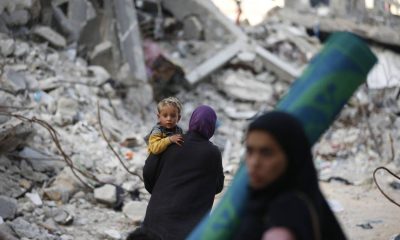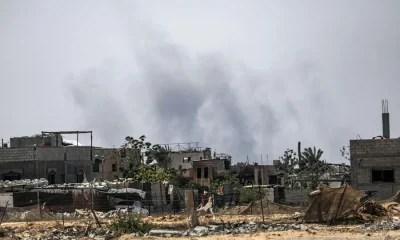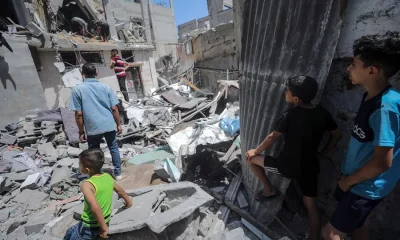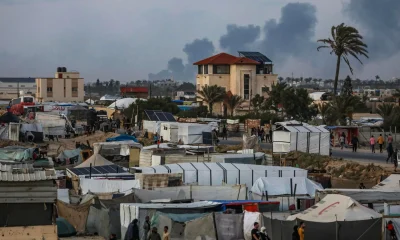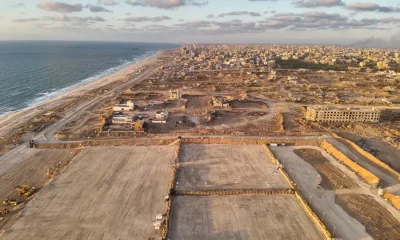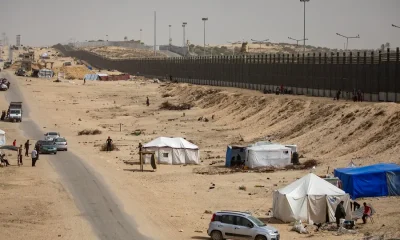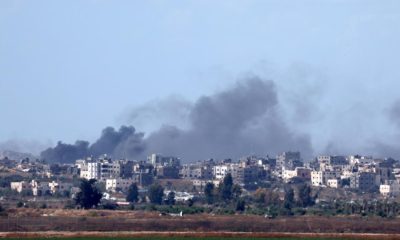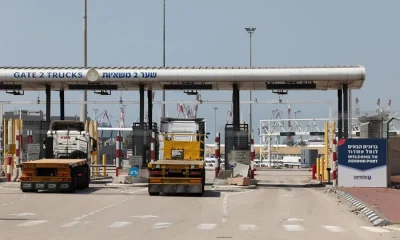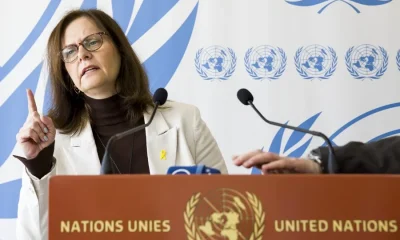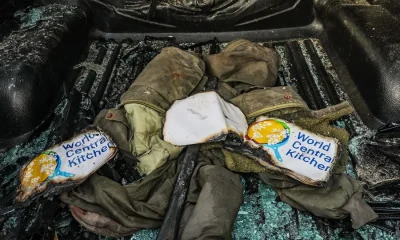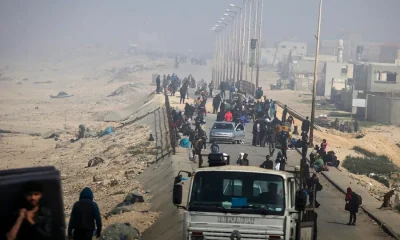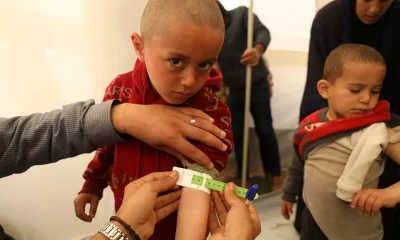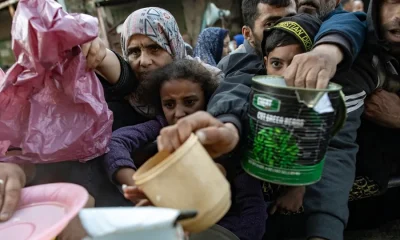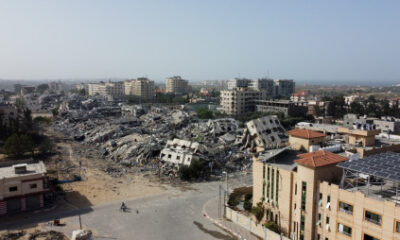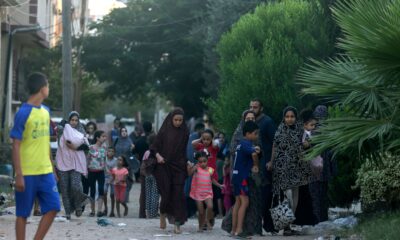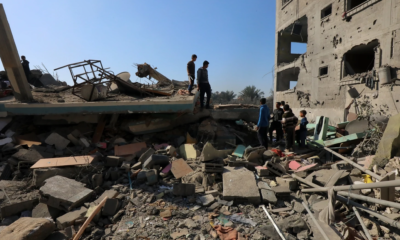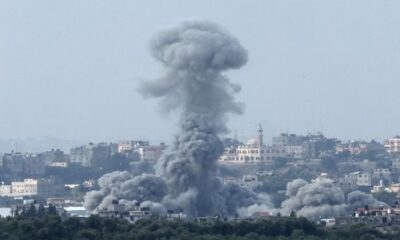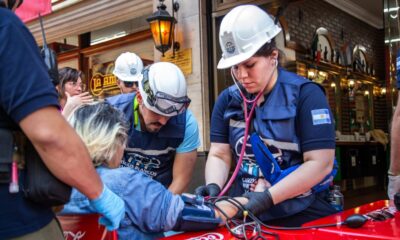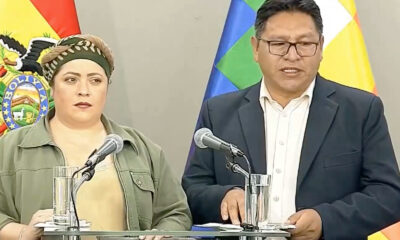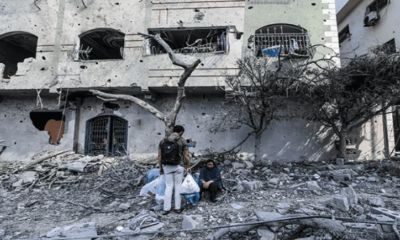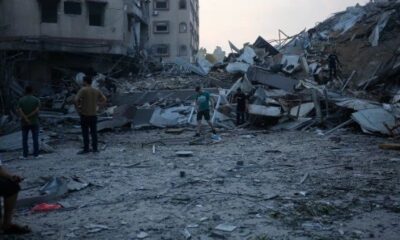International
Armed settlers attack Palestinian villages as Iranian threat plans over Israel
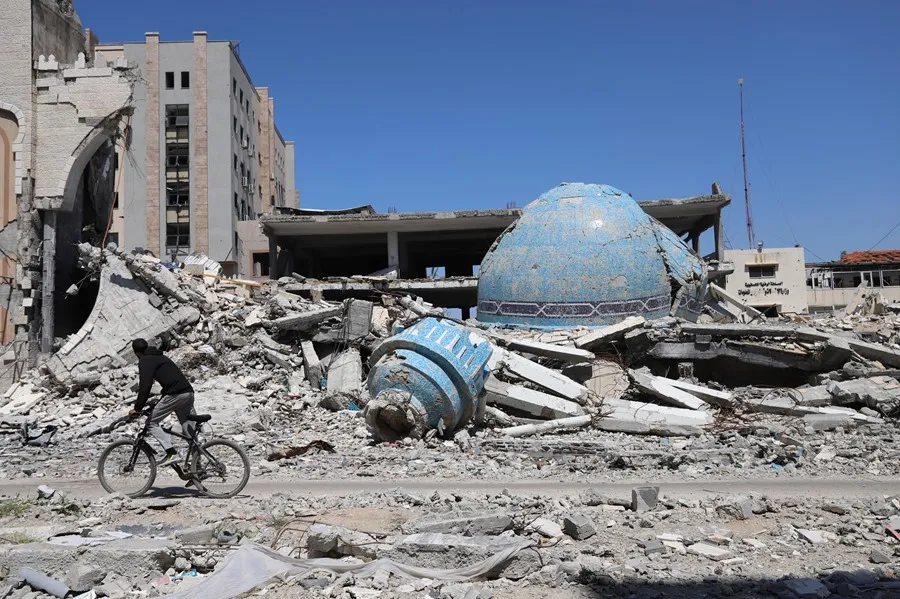
Armed settlers attacked ten villages in the occupied West Bank on Saturday, leaving more than a dozen Palestinians wounded by bullets, after a 14-year-old Israeli teenager was found dead near a settlement; the escalation occurs while Israel remains on alert to the Iranian threat of attacking the Jewish State.
According to medical sources of the Palestinian Red Crescent, more than a dozen Palestinians were wounded by bullets today – five in the village of Al Mughayir, where yesterday a 25-year-old Palestinian died in a first attack by settlers along with law enforcement forces – and another five in the village of Duma, northeast of Ramalla.
At least three more were beaten, and one Palestinian was injured with rubber bullets in widespread attacks – with burning of homes and destruction of cars – according to a count by the Israeli NGO Yesh Din in eight other villages: As Sawiya, Qusra, Beitin, Silwad, Sinjil, Beitillu, Turmusaya and Beit Furik.
The Palestinian Prime Minister, Mohamad Mustafa, today condemned the attacks of Jewish settlers in the occupied West Bank and said in a statement that they will “not deter” Palestinians from “remaining in their land.” With the start of the war in Gaza, these attacks have increased to more than 700 since October, according to OCHA.
These attacks occurred after a search device found this afternoon with a drone the lifeless body, near the outpost of Malachei HaShalom (illegal settlement also under Israeli law) of the 14-year-old settler Benjamin Achimeir, who disappeared yesterday at 6:00 in the morning when he went out to herd sheep.
The Israeli Army reported that the violence and clashes “had ended” tonight and announced more military and police presence in the West Bank, according to a statement.
According to the text, members of the Israeli security forces were also injured in the clashes that lasted for hours, and the Army reported the use of “anti-riot dispersal means” to end the altercations.
The Israeli Minister of Defense, Yoav Gallant, today asked Israelis via X that they will not take “justice in their own hands” and to let “the security forces act quickly in the search for the terrorists.”
“Acts of revenge will make the mission of our soldiers difficult. Justice should not be taken by its own hands,” he said in reference to the search operation to find the person responsible for the death of the Jewish teenager, who the authorities believe is Palestinian.
The Israeli Prime Minister, Benjamin Netanyahu, sent his condolences to the family, in what he called an “atrocious murder,” and assured that those responsible will be punished as “anyone who damages the citizens of the State of Israel.”
Meanwhile, the Army said it was still on “high alert” to protect itself from “new Iranian aggressions,” as the Israeli military spokesman, Rear Admiral Daniel Hagari, said today in a statement shortly after the capture by Iran of a freighter in the Persian Gulf, to which he made no reference, was known.
The Israeli Foreign Minister, Israel Katz, did confirm the participation of the Iranian Revolutionary Guard in the hijacking of the ship, linked to the company ‘Zodiac Maritime’ owned by an Israeli billionaire, and asked the European Union to declare that Persian military corps a “terrorist organization.”
Hours later, the Ministry of Defense claimed to have increased security measures.
The capture has further increased tension in the Middle East, and especially in Israel, which awaits a reprisal attack after the bombing of the Tehran consulate in Damascus on April 1, which claimed the lives of half a dozen Iranians.
Despite the official alert, the population has hardly altered their behavior at all: the bars are still full and, tonight, a large demonstration has been called in Tel Aviv against the Netanyahu Government and for the return of the hostages from the Gaza Strip.
The Palestinian Islamist group Hamas informed on Saturday the intermediaries of Egypt and Qatar, who have been working for months to try to achieve a truce in the war in Gaza, its rejection of the latest proposal, mediated by the United States, which it received last Monday and calls for a “permanent ceasefire.”
“In Hamas we reaffirm our adherence to our demands and the national demands of our people,” Hamas said in a statement, in which it reiterated its four requirements for an agreement: a permanent ceasefire, the withdrawal of the Israeli “occupation army” from all Gaza, the return of displaced people from the northern of the Strip, and a greater entry of humanitarian aid and the beginning of reconstruction.
“We also confirm our willingness to close an agreement,” the statement says, through “a serious and real exchange of prisoners between the two parties.”
According to leaks to the Israeli media and sources close to the negotiations in Cairo contacted by EFE, the last agreement on the table included six weeks of ceasefire, and a first exchange of 40 hostages for about 900 Palestinian prisoners; a hundred of them with long sentences.
International
ACLU seeks emergency court order to stop venezuelan deportations under Wartime Law

The American Civil Liberties Union (ACLU) on Friday asked two federal judges to block the U.S. government under President Donald Trump from deporting any Venezuelan nationals detained in North Texas under a rarely used 18th-century wartime law, arguing that immigration officials appear to be moving forward with deportations despite Supreme Court-imposed limitations.
The ACLU has already filed lawsuits to stop the deportation of two Venezuelan men held at the Bluebonnet Detention Center, challenging the application of the Alien Enemies Act of 1798. The organization is now seeking a broader court order that would prevent the deportation of any immigrant in the region under that law.
In an emergency filing early Friday, the ACLU warned that immigration authorities were accusing other Venezuelan detainees of being members of the Tren de Aragua, a transnational criminal gang. These accusations, the ACLU argues, are being used to justify deportations under the wartime statute.
The Alien Enemies Act has only been invoked three times in U.S. history — most notably during World War II to detain Japanese-American civilians in internment camps. The Trump administration has claimed the law allows them to swiftly remove individuals identified as gang members, regardless of their immigration status.
The ACLU, together with Democracy Forward, filed legal actions aiming to suspend all deportations carried out under the law. Although the U.S. Supreme Court recently allowed deportations to resume, it unanimously ruled that they could only proceed if detainees are given a chance to present their cases in court and are granted “a reasonable amount of time” to challenge their pending removal.
International
Dominican ‘False Hero’ Arrested for Faking Role in Nightclub Collapse That Killed 231

A man identified as Rafael Rosario Mota falsely claimed to have rescued 12 people from the collapse of the Jet Set nightclub in Santo Domingo—a tragedy that left 231 people dead—but he was never at the scene.
Intelligence agents in the Dominican Republic arrested the 32-year-old man for pretending to be a hero who saved lives during the catastrophic incident, authorities announced.
Rosario Mota had been charging for media interviews in which he falsely claimed to have pulled survivors from the rubble after the nightclub’s roof collapsed in the early hours of April 8, during a concert by merengue singer Rubby Pérez, who was among those killed.
“He was never at the scene of the tragedy,” the police stated. The arrest took place just after he finished another interview on a digital platform, where he repeated his fabricated story in exchange for money as part of a “media tour” filled with manipulated information and invented testimonies.
“False hero!” read a message shared on the police force’s Instagram account alongside a short video of the suspect, in which he apologized: “I did it because I was paid. I ask forgiveness from the public and the authorities.”
Central America
Nicaraguan Exiles to Mark 7th Anniversary of 2018 Protests with Global Commemorations

The Nicaraguan opposition in exile announced on Thursday that it will commemorate the seventh anniversary of the April 2018 protests against the government of President Daniel Ortega and his wife, Rosario Murillo, with events in Costa Rica, the United States, and several European countries.
The commemorative activities—which will call for justice for the victims, as well as freedom and democracy for Nicaragua—will include religious services, public forums, cultural fairs, and other public gatherings, according to official announcements.
In April 2018, thousands of Nicaraguans took to the streets to protest controversial reforms to the social security system. The government’s violent response quickly turned the demonstrations into a broader call for the resignation of President Ortega, who is now 79 and has been in power since 2007.
The protests resulted in at least 355 deaths, according to the Inter-American Commission on Human Rights (IACHR), although Nicaraguan organizations claim the toll is as high as 684. Ortega has acknowledged “more than 300” deaths and maintains the unrest was an attempted coup d’état.
-

 Central America4 days ago
Central America4 days agoHonduran Police Offer $135K for Tips Leading to the Arrest of Romeo Vásquez
-

 Central America3 days ago
Central America3 days agoPetro questions Ecuador’s vote, cites reports of military control and arrests
-

 International4 days ago
International4 days agoMPV Denounces Electoral Blockade as Secretary-General is Disqualified for May Elections
-

 International2 days ago
International2 days agoArsenal stun Real Madrid at the Bernabéu to reach Champions League semifinals
-

 International4 days ago
International4 days agoMaduro Plans Major Workers’ March on May 1st to Defend Venezuela’s Freedom
-

 International2 days ago
International2 days agoBogotá residents line up for yellow fever vaccine amid national alert
-

 International1 day ago
International1 day agoDominican ‘False Hero’ Arrested for Faking Role in Nightclub Collapse That Killed 231
-

 Central America1 day ago
Central America1 day agoNicaraguan Exiles to Mark 7th Anniversary of 2018 Protests with Global Commemorations
-

 International2 days ago
International2 days agoMexico refuses to restore ties with Ecuador while Noboa remains in office
-

 International2 days ago
International2 days agoDeSantis’ immigration crackdown sparks alarm in Venezuelan Communities in Doral
-

 International3 days ago
International3 days agoColombia: Search continues for missing limb of italian scientist found dismembered
-

 International2 hours ago
International2 hours agoACLU seeks emergency court order to stop venezuelan deportations under Wartime Law
-

 Central America2 hours ago
Central America2 hours agoUN complaint filed against Costa Rica over detention of migrant children














